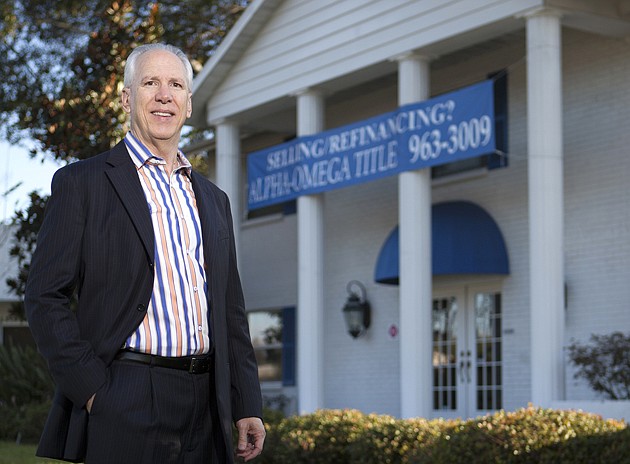Gibbs Wilson is a survivor.
Just 10 years ago, Wilson beat all odds and survived what doctors refer to as a “widow-maker” heart attack. His wife, 10 weeks pregnant with twins, was told that there was only a 2% chance that her husband would survive. If he managed to stay alive, most likely he would be unresponsive.
“But by the grace of God, I'm one of the 2% that survived,” Wilson, now 60, says. The story has repeated itself in Wilson's work life, as the CEO and founder of Alpha-Omega Title Insurance Agency.
Wilson credits that same grace for helping his business outlast the real estate crisis. That, and his seasoned employees, service diversification and funds from his personal savings account, he adds.
Wilson says he couldn't give up on the small business that he started in 1983 with two employees. He had built the company up to 34 employees in 2006, bringing in more than $3.6 million in annual revenues. When the real estate market crashed, Alpha-Omega's revenues quickly dropped to less than $1.6 million in 2009, and Wilson was forced to cut his team in half.
January 2009 marked the worst month in the real estate title and mortgage industry, according to Wilson.
Luckily, he had a significant amount of savings from the boom time, unlike a number of other title agents who spent rapidly when they were doing well, he says. “We saved money from the good days for the rainy days that came.”

“In the darkest days, my wife was daily reminding me that we would be better off just getting a minimum wage job rather than keep the business going,” Wilson says. “We were paying out of our savings to keep the door open; it was a brutal time financially as well as emotionally.”
He wasn't ready to give up; he felt he had an obligation as CEO of the company. “I didn't feel it was time to cash in the chips as some had done,” he admits. “It wasn't without blood, sweat and tears that we pushed through those dark days.”
Making his team leaner and more efficient, Wilson once again beat the odds. At least 60% of his competitors shut their doors during the downturn, Wilson says.
The diversity of his firm's clients played a major part in the firm's turnaround, Wilson says. Traditionally, the firm was heavily focused on residential sales, with the listing Realtor as the principal customer. During the downturn, the company expanded work to the commercial arena, including residential homebuilders, the condo and conversion market, as well as servicing loan officers and residential refinancers, he says.
In addition, when other firms were forced to close shop, Wilson was able to hire a handful of seasoned veterans in the industry who were let go by other agencies. Now Alpha-Omega's typical closer has more than 25 years' experience, helping the firm close quicker, with fewer problems, Wilson says. Especially when dealing with more complex situations involving distressed property, title defects, and a variety of loans, judgments and problems on residential titles.
Currently, the company is back to concentrating on broadening its customer base of residential Realtors, with the uptick in the market. Wilson hired four full-time marketers to help him encourage new Realtors to try out Alpha-Omega. After they've worked with the company just once, Wilson says they'll be back for more.
Like most in real estate, 2005 and 2006 marked his firm's best years up until last year, Wilson says. Both 2012 and 2013 have been more profitable, despite lower gross revenue, a trend Wilson attributes to newfound efficiencies in the downturn. Back up to 22 employees, Wilson says his company is still in “recovery mode.”
“Having survived that time, we have been blessed,” he says.
Turnaround tip
Alpha-Omega Title Insurance Agency founder and CEO Gibbs Wilson advises other executives to join leadership groups for encouragement, support, and advice for pushing through the tough times. He says his discussions with fellow CEOs eased the process of hiring new employees and letting people go. Wilson worked with the CEO Council of Tampa Bay, the C-12 Christian Leadership Development Organization, and TEC/Vistage. Monthly economic updates with the groups helped him to determine when he had to “hunker down and be more lean,” he said, and when it was time to “hire more marketing resources to ride the waves of the upward moving economy.”







